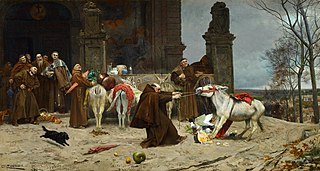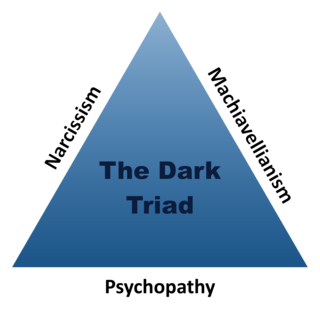
The bad boy is a cultural archetype that is variously defined and often used synonymously with the historic terms rake or cad: a male who behaves badly, especially within societal norms.

The bad boy is a cultural archetype that is variously defined and often used synonymously with the historic terms rake or cad: a male who behaves badly, especially within societal norms.
The stereotypical "bad guy" was described by Kristina Grish in her book Addickted as "the irresistible rogue who has the dizzying ability to drive women wild" with a "laissez-faire attitude about life and love". [3]
An article in The Independent compared the term "bad boys" with men who had a particular combination of personality traits, sometimes referred to as a "dark triad" of Machiavellian traits, and reported that a study found that such men were likely to have a greater number of sexual affairs. [4]

Schadenfreude is the experience of pleasure, joy, or self-satisfaction that comes from learning of or witnessing the troubles, failures, pain, or humiliation of another. It is a borrowed word from German, the English word for it is "epicaricacy", that originated in the 18th century. Schadenfreude has been detected in children as young as 24 months and may be an important social emotion establishing "inequity aversion".

In sexuality, seduction means enticing to sexual intercourse.

Benjamin A. Foster is an American actor. He has had roles in films including The Punisher (2004), X-Men: The Last Stand and Alpha Dog, The Messenger and Pandorum, The Mechanic (2011), Contraband (2012), Kill Your Darlings and Lone Survivor, The Program (2015), and Leave No Trace (2018). He was nominated for a Saturn Award and a Satellite Award for his role in 3:10 to Yuma (2007) and won an Independent Spirit Award for portraying Tanner Howard in Hell or High Water (2016). He also acted as Russell Corwin in Six Feet Under (2003–2005). He had a recurring role portraying a high school student named Eli on the Judd Apatow show Freaks and Geeks (2000), which ran for one season.

Nicholas Caradoc Hoult is an English actor. His filmography includes supporting work in big-budget mainstream productions and starring roles in independent projects in the American and British film industries. He has received several accolades, including nominations for a British Academy Film Award, two Golden Globe Awards, and a Primetime Emmy Award. He was included in Forbes 30 Under 30 in 2012.
Patrick Maxwell Renna is an American actor and film producer best known for his role as Hamilton "Ham" Porter in the 1993 baseball film The Sandlot. Some of his later projects include, Bad Roomies, his first film as a producer, a recurring role on Netflix's hit GLOW and the independent film Boys of Summer, which was released in 2022.

Leighton Marissa Meester is an American actress and singer. She is known for her starring role as scheming socialite Blair Waldorf on Gossip Girl, which ran from 2007 to 2012 on The CW. She has also appeared in films such as Killer Movie (2008), Country Strong (2010), The Roommate (2011), Monte Carlo (2011), The Oranges (2011), The Judge (2014), The Weekend Away (2022), and EXmas (2023). She portrayed Angie D'Amato on the ABC sitcom Single Parents (2018–2020). Meester made her Broadway debut in Of Mice and Men (2014).
"Nice guy" is an informal term, commonly used with either a literal or a sarcastic meaning, for a man.
Himbo, a portmanteau of the English masculine pronoun him and bimbo, is a slang term for an attractive but unintelligent man. The first known use dates back to 1988; the word gained renewed popularity and attention in the 2010s and 2020s. Since its inception, the term and the stereotype it describes have generated a range of commentary and reactions from writers, entertainers, linguists, and cultural analysts.

Oh Yeon-soo is a South Korean actress.
Kristina Wong is an American comedian known primarily for her work as a solo theater performer, performance artist, and actor. She identifies as a feminist and her work often tackles themes regarding race, sex, and privilege, often in conjunction with the Asian-American experience, through a satirical lens.

The dark triad is a psychological theory of personality, first published by Delroy L. Paulhus and Kevin M. Williams in 2002, that describes three notably offensive, but non-pathological personality types: Machiavellianism, sub-clinical narcissism, and sub-clinical psychopathy. Each of these personality types is called dark because each is considered to contain malevolent qualities.
Michael Chan is a Hong Kong actor and martial artist. A Hakka of Wuhua ancestry born in New Territories, Chan was well known for various triad roles, when in actuality he had been involved with triads in real life. In a media interview, he admitted to have been the No. 2 in the 14K Triad that dominated vice in Tsim Sha Tsui before the handover of Hong Kong. Having worked as a police officer in the prison system, he came into contact with many underworld figures and joined the Triads. Chan was expelled from the Royal Hong Kong Police as a result of his links.

Bobbi Kristina Brown was an American reality television personality and singer. She was the only child of singers Bobby Brown and Whitney Houston. Her parents' fame kept Brown in the public eye, as did her appearances on the reality show Being Bobby Brown.
Androgyny is the possession of both masculine and feminine characteristics. Androgyny may be expressed with regard to biological sex, gender identity, or gender expression.
In psychology, manipulation is defined as subterfuge designed to influence or control another, usually in a manner which facilitates one's personal aims. The methods used distort or orient the interlocutor's perception of reality, in particular through seduction, suggestion, persuasion and non-voluntary or consensual submission. Definitions for the term vary in which behavior is specifically included, influenced by both culture and whether referring to the general population or used in clinical contexts. Manipulation is generally considered a dishonest form of social influence as it is used at the expense of others.
Machiavellianism in the workplace is a concept studied by many organizational psychologists. Conceptualized originally by Richard Christie and Florence Geis, Machiavellianism refers to a psychological trait concept where individuals behave in a cold and duplicitous manner. It has in recent times been adapted and applied to the context of the workplace and organizations by many writers and academics.
The concept of toxic masculinity is used in academic and media discussions to refer to those aspects of hegemonic masculinity that are socially destructive, such as misogyny, homophobia, and violent domination. These traits are considered "toxic" due in part to their promotion of violence, including sexual assault and domestic violence. Socialization of boys sometimes also normalizes violence, such as in the saying "boys will be boys" about bullying and aggression.
"Tall, dark, and handsome" is a phrase that may refer to an appealing man, however the true meaning of the phrase is disputed. It originates from cheap romantic fiction produced in the early 1900s.

In the field of personality psychology, Machiavellianism is a personality trait characterized by interpersonal manipulation, indifference to morality, lack of empathy, and a strategic focus on self-interest. Psychologists Richard Christie and Florence Geis named the trait after Niccolò Machiavelli, as they used edited and truncated statements inspired by his works to study variations in human behaviors. Their Mach IV test, a 20-question, Likert-scale personality survey, became the standard self-assessment tool and scale of the Machiavellianism construct. Those who score high on the scale are more likely to have a high level of deceitfulness and a cynical, unemotional temperament.